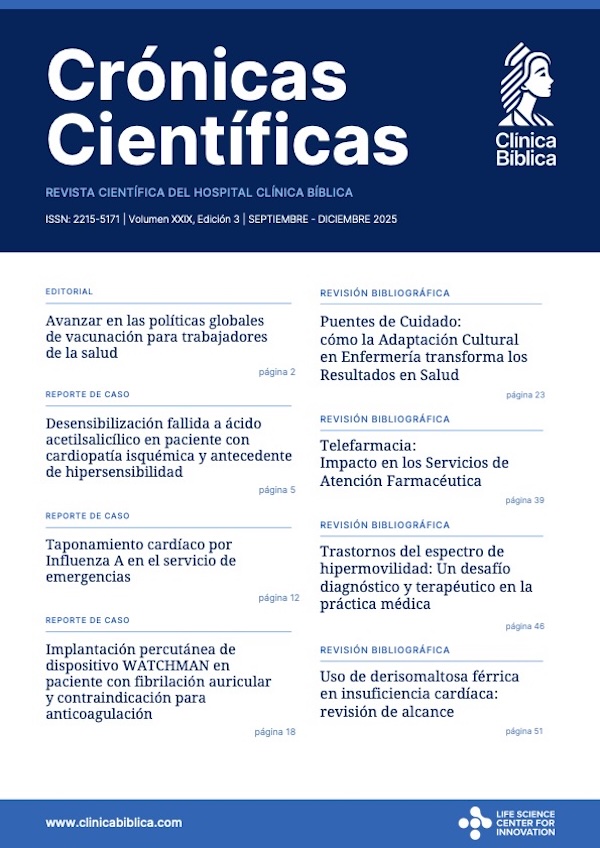- Visto: 1238
Revisión Bibliográfica
Delirium postoperatorio como complicación en el adulto mayor
Postoperative delirium as a complication in the elderly
Edición XVI Setiembre - Diciembre 2020
DOI: https://doi.org/10.55139/ELGN1933
APA (7ª edición)
Guadamuz Hernández, S., & Suárez Brenes, G. (2020). Delirium postoperatorio como complicación en el adulto mayor. Crónicas científicas, 16(16), 64-71. https://doi.org/10.55139/ELGN1933.
Vancouver
Guadamuz Hernández S, Suárez Brenes G. Delirium postoperatorio como complicación en el adulto mayor. Cron cient . 11 de agosto 2020; 16(16): 64-71.
Dra. Sylvia Guadamuz Hernández
Médico y cirujano. Universidad de Costa Rica.
Investigadora Independiente.
Miembro del Colegio de Médicos y Cirujanos de Costa Rica.
Dr. Gabriel Suárez Brenes
Médico y cirujano. Universidad de Costa Rica.
Investigador Independiente.
Miembro del Colegio de Médicos y Cirujanos de Costa Rica.
Resumen
Debido al aumento en la expectativa de vida y en la reserva funcional de los adultos mayores ha habido un auge en la realización de cirugías en este grupo etario. Dentro de las complicaciones postquirúrgicas que se pueden encontrar, está la disfunción cognitiva postoperatoria y dentro de ella se encuentra el delirium postoperatorio, que es un estado transitorio y de rápida instauración –a veces fluctuante– de alteración de la función cognitiva global y de la atención. Aunque el mecanismo fisiopatológico no ha sido esclarecido en su totalidad se tiene la hipótesis de que procesos inflamatorios juegan un papel importante en su aparición. Los factores de riesgo más probables para la aparición de esta entidad se dividen en preoperatorios, intraoperatorios y postoperatorios, por lo que es importante conocerlos para poder así llevar a cabo medidas preventivas apropiadas. Por último, se estudiarán los criterios diagnósticos así como el abordaje que se le puede dar a esta condición.
Palabras claves
Delirium postoperatorio, disfunción cognitiva postoperatoria, adulto mayor, anestesia, cirugía.
Abstract
Due to the increase in life expectancy and in the functional reserve of the elderly, there has been an increase in the number of surgeries performed within this age group. Among the postoperative complications that can be found is postoperative cognitive dysfunction and within it is the postoperative delirium that is a transient state of rapid establishment, sometimes fluctuating, and an alteration of the global cognitive function and of attention. Although the pathophysiological mechanism has not been fully clarified, there is a hypothesis of inflammatory processes that have an important role in its appearance. The most likely risk factors for the presentation of this entity are divided into preoperative, intraoperative and postoperative risk factors, and knowledge of them is important in order to carry out appropriate preventive measures. Finally, the diagnostic criteria will be studied as well as the approach that can be given to this condition.
Keywords
Postoperative delirium, postoperative cognitive dysfunction, older adult, anesthesia, surgery.
Bibliografía
Akhtar, S. y Ramani, R. (2015). Geriatric Pharmacology. Anesthesiology clinics of North America, 33(3), 457-469.
Aurini, L. y White, P. (2014). Anesthesia for the elderly outpatient. Current opinion in anesthesiology, 27, 563-575.
Cassel, C., Cohen, H., Larson, E. y Meier, D. (2003). En Geriatric Medicine an Evidence-Based Approach (pp. 239-257). Nueva York: Springer-Verlag.
Chan, S. P., Ip, K. Y. y Irwin, M.G. (2019). Peri-operative optimisation of elderly and frail patients: a narrative review. Anaesthesia, 74(1), 80-89.
D’Hyver, C. y Gutiérrez, L.M. (2014). En Geriatría (pp. 510-521, 524). México, D. F.: Editorial El Manual Moderno.
Evered, L., Scott, D. y Silbert, B. (2017). Cognitive decline associated with anesthesia and surgery in the elderly: does this contribute to dementia prevalence? Current opinion in psychiatry, 30(3), 220-226.
Evered, L. y Silbert, B. (2018). Postoperative Cognitive Dysfunction and Noncardiac Surgery. Anesthesia and analgesia, 127(2), 496-505.
García, P., Duggan, E., McCoulloug, I., Lee, S. y Fishman, D. (2015). Postanesthesia Care for the Elderly Patient. Clinical Therapeutics, 37(12), 2651-2665.
Inouye, S., Growdon, M. y Fong, T. (2017). Delirium. En J. Halter, J. Ouslander, M. Tinetti, S. Studenski, K. High, S. Asthana, M. Supiano, C. Ritchie, Hazzard´s Geriatric Medicine and Gerontology (7th ed.) (pp. 882-898). Nueva York, EE. UU.: McGraw-Hill.
Inouye, S., Marcantonio, E., Kosar, C., Tommet, D., Schmitt, E., Travison, T., Saczynski, J., Ngo, L., Alsop, D. y Jones, R. (2016). The Short- and Long-Term Relationship between Delirium and Cognitive Trajectory in Older Surgical Patients. Alzheimer's & dementia: the journal of the Alzheimer's Association, 12(7), 766-775.
Liang, C.K., Chu, C.L., Lin, Y.T., Lu, T., Hsu, C.J. y Chen, L.K. (2014). Interrelationship of postoperative delirium and cognitive impairment and their impact on the functional status in older patients undergoing orthopaedic surgery: a prospective cohort study. PLoS One, 9(11), e110339. doi: 10.1371/journal.pone.0110339
Mahanna-Gabrielli, E. y Eckenhoff, R. (2019). Perioperative neurocognitive disorders. Waltham, MA: UpToDate Inc.
Soler, P. y Rodríguez, L. (2015). El anciano obeso. En Tratado de Medicina Geriátrica: Fundamentos de atención sanitaria a los adultos mayores (pp. 327-335). Barcelona: Elsevier.
Steinmetz, J. y Rasmussen, L. S. (2018). Anesthesia and the risk of dementia in the elderly. Presse Medicale. https://doi.org/10.1016/j.lpm.2018.03.013
Strøm, C., Rasmussen, L. y Steinmetz, J. (2016). Practical Management of Anaesthesia in the Elderly. Drugs Aging, 33(11), 765-777.
Tzimas, P., Samara, E., Petrou, A., Komompilias, A, Chalkias, A. y Papadopoulos, G. (2018). The influence of anesthetic techniques on postoperative cognitive function in elderly patients undergoing hip fracture surgery: General vs Spinal Anesthesia. Injury, International journal of the care of the injured. https://doi.org/10.1016/j.injury.2018.09.023
APA (7ª edición)
Guadamuz Hernández, S., & Suárez Brenes, G. (2020). Delirium postoperatorio como complicación en el adulto mayor. Crónicas científicas, 16(16), 64-71. https://doi.org/10.55139/ELGN1933.
Vancouver
Guadamuz Hernández S, Suárez Brenes G. Delirium postoperatorio como complicación en el adulto mayor. Cron cient . 11 de agosto 2020; 16(16): 64-71.
Esta obra está bajo una licencia internacional Creative Commons: Atribución-NoComercial-CompartirIgual 4.0 Internacional (CC BY-NC-SA 4.0)

Realizar búsqueda
Última Edición
Ediciones Anteriores






